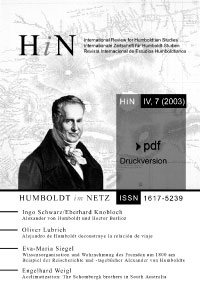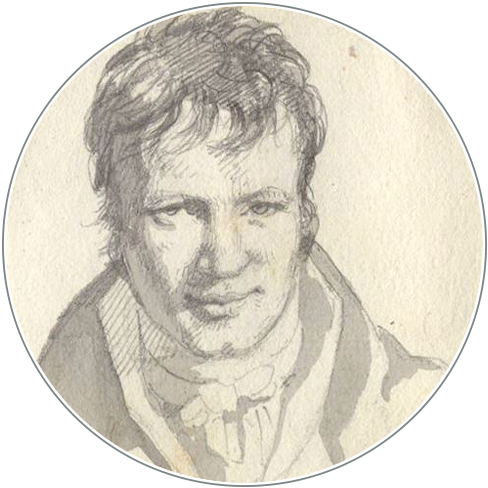“[M]on extrême répugnance à écrire la relation de mon voyage” - Alejandro de Humboldt deconstruye la relación de viaje
DOI :
https://doi.org/10.18443/41Mots-clés :
1814-1831, Dekonstruktion, José Aníbal Campos, Relation historiqueRésumé
Resumen
La relación de viaje de Alejandro de Humboldt sobre América desafía las definiciones genéricas: es un complejo híbrido de diversos discursos científicos, documentaciones de datos empíricos, diario personal y formas tradicionales de la narrativa de viaje. La poética de Humboldt socava específicamente el formato convencional de una relación de viaje. Todos sus elementos centrales, aquéllos que podrían otorgar coherencia al texto, están cargados de múltiples significados que lo desestabilizan:
(1) el sujeto (viajero, autor, narrador, firma, pronombres personales),
(2) el objeto (los países que, supuestamente, la relación de viaje debe tematizar, las formas variadas y contradictorias de la descripción y la denominación en el texto),
(3) el destinatario (tanto lo explícitamente narrado como el lector implícito y la comunidad de interpretación) y, finalmente,
(4) el texto en sí mismo (como género literario o fenómeno discursivo, su formato, su polifonía, su autorreferencialidad y su autorreflexión).
Un análisis narratológico y una lectura estructural del texto nos llevan a preguntarnos cómo la poética de Humboldt refleja su aproximación a la diferencia cultural. El modo específico de la deconstrucción de la relación de viaje que funciona aquí, desautoriza las formas imperiales de la escritura colonial. No hay „identidades" ni „diferencias" que puedan ser definidas inequívocamente desde una perspectiva privilegiada.
Abstract
Alexander von Humboldt's American travelogue (Relation historique du Voyage aux Régions équinoxiales du Nouveau Continent, 3 vols., 1814-1831) defies generic definitions: It is a complex hybrid of diverse scientific discourses, documentations of empirical data, diary writing, and traditional forms of travel narrative. Humboldt's poetics specifically undermine the conventional format of the travelogue. All its central features which could lend the text coherence and make it readable for the recipient, are charged with multiple meanings and become thus destabilized:
(1) the subject (traveller, author, narrator, signature, personal pronouns),
(2) the object (the countries that the travelogue is supposed to thematize, their various and contradictory forms of denomination and description in the text),
(3) the addressee (the explicit narratee as well as the implicit reader and the interpretive community), and finally
(4) the text itself (as a literary genre or discoursive phenomenon, its format, its polyphony, its self-reference and self-reflection).
A narratological analysis and a structural reading lead us to the question of how Humboldt's poetics reflect his approach to cultural difference. The specific kind of deconstruction of the travelogue which is at work here de-authorizes imperial forms of colonial writing. There are no "identities" and "differences" which can be defined unequivocally from a privileged perspective. Humboldt's travelogue can thus be read within the paradigm provided by contemporary postcolonial theory: In the encounter with „the other“, Homi Bhabha observed, „the language of the master becomes hybrid“.
Téléchargements
Comment citer
Numéro
Rubrique
Licence
(c) Tous droits réservés Oliver Lubrich 2003

Ce travail est disponible sous licence Creative Commons Attribution - Pas d’Utilisation Commerciale 4.0 International.
Les droits des articles envoyés restent la propriété de leurs auteurs et sont publiées sous la licence Creative Commons-Lizenz (CC BY-NC 4.0). Tous les auteurs publiant dans le HiN doivent accepter ce modèle de licence.
Les auteurs doivent eux-mêmes s’occuper de l’obtention des droits d’auteur pour les images utilisées.
Les divers éléments de la mise en page et du design de la revue sont protégés et ne peuvent être récupérés et réutilisés dans d’autres publications sans autorisation préalable de la part de HiN.










